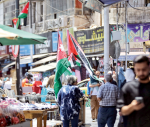You are here
Tunisian president dissolves top judicial watchdog alleging bias
By AFP - Feb 06,2022 - Last updated at Feb 06,2022
TUNIS — Tunisian President Kais Saied on Sunday dissolved a top independent judicial watchdog accusing it of bias, the latest controversial move since he sacked the government last year.
Saied has broadened his grip on power since July 25, when he sacked the government and froze parliament before moving to rule by decree in Tunisia, the cradle of the 2011 Arab Spring uprisings that ousted a series of autocratic leaders.
Many in the North African nation welcomed his moves against a political system described as corrupt and ineffective, in the only democracy to have emerged from the revolts.
But political figures and rights groups have warned of a slide towards authoritarianism, and world leaders have expressed deep concern.
In a move sparking further unease, Saied early Sunday announced he was dissolving the Supreme Judicial Council (CSM) during a meeting with government ministers.
The council "is a thing of the past", he said according to video footage released by the Tunisian presidency.
He accused the CSM, an independent constitutional body set up in 2016 to guarantee the good functioning and independence of the judiciary, of serving political interests.
“In this council, positions and appointments are sold and made according to affiliations,” said the head of state.
“You cannot imagine the money that certain judges have been able to receive, billions and billions,” he added.
‘Illegal and unconstitutional’
Observers say the government is seeking to clamp down on the Islamist-inspired Ennahdha Party, which has controlled parliament and the various governments since the 2011 revolution toppled veteran leader Zine El Abidine Ben Ali.
The International Commission of Jurists said the president’s corruption accusations were “unfounded”, saying the CSM council “has defended the independence of the judiciary” and that “any decree to dissolve it is illegal and unconstitutional”.
“Its dissolution would mean the end of the separation of powers,” it added.
The president accused the CSM of corruption and of delaying politically sensitive investigations into the 2013 assassinations of left-wing opposition figures Chokri Belaid and Mohamed Brahmi.
The Daesh terror group claimed both killings, while Ennahdha, which has denounced Saied’s power grab as a “coup”, has been accused by many of blocking the investigations.
“Unfortunately, in this country, some judges in the courts have manipulated the Chokri Belaid case,” said Saied in the video.
Belaid was shot three times outside his home in February 2013, and Brahmi was killed in similar circumstances in July the same year.
The “July 25 movement”, composed of Saied supporters, on Saturday called on the president to dissolve the CSM in order to “purge” the judiciary of “corrupt magistrates”.
Created in 2016, the watchdog has 45 members, two thirds of whom are judges elected by parliament, who in turn chose the remaining third.
The CSM had been already targeted last month by Saied, when he stripped its members of social and financial benefits, including fuel subsidies, transport and living allowances.
‘Fair and independent’
Saied, who has also already called for a July referendum on constitutional reforms, said on Sunday he was working “on a provisional decree” to reorganise the judicial watchdog.
“One of the key rights of Tunisians is to know the truth,” he said in a statement.
Tunisians, he said, are entitled “to have a just judicial system whose conduct is overseen by judges who only implement the law”.
Ibrahim Bouderbala, president of the National Bar Association, welcomed the move.
“As soon as the decree is published, we will react positively,” Bouderbala said.
Rallies on Sunday in the capital Tunis, held to commemorate the ninth anniversary of the assassination of Belaid, saw some 500 protesters demanding a “fair and independent justice” chant slogans backing the president.
Belaid’s brother Abdelmajid also backed Saied’s decision, accusing Ennahdha of having “manipulated and slowed down” the case.
“Until we have dissolved the CSM we will never have the truth,” he said.
Related Articles
TUNIS — Tunisian judges on Wednesday started a widely observed nationwide strike, days after President Kais Saied announced he would dissolv
TUNIS — Tunisia's President Kais Saied inaugurated a "temporary" council of judges on Monday, which replaces an independent watchdog that he
TUNIS — Tunisian police on Monday blocked access to the country's top judicial watchdog in a move its chief slammed as "illegal", two days a
















